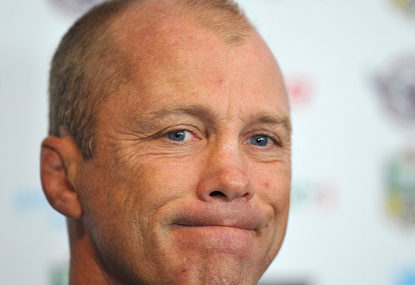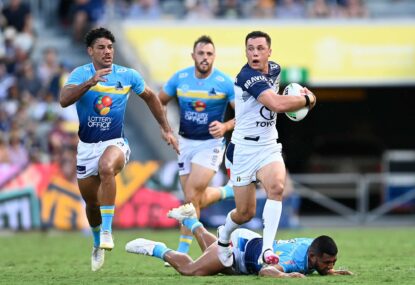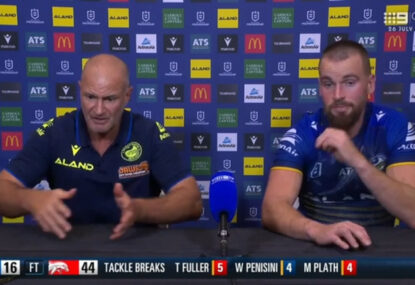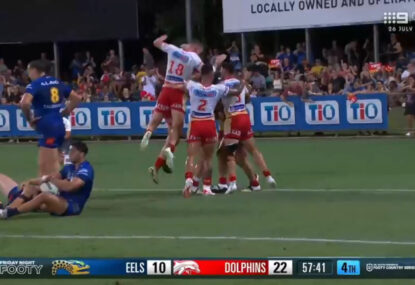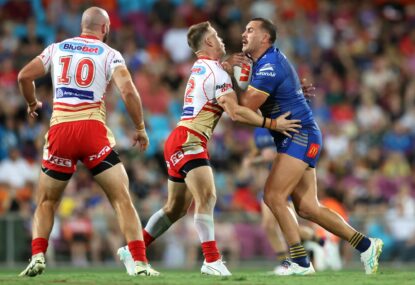Coaching is far harder than I ever imagined it would be. Execution of a game plan is extraordinarily hard, and for head coaches there is no end to the scope of what you have to worry about.
There is a public and private face to coaching.There are some coaches whose reputation is that of a genius and yet when you ask players, they shake their heads with a knowing look that says ‘this bloke has no idea’.
Other times a coach will work very hard to drive a team to success but simply can’t make enough headway for the board, so the next bloke inherits a team on the rise.
Some people are simply not meant to be head coaches and you don’t find out until they are in charge. It’s a tough gig.
I’ve been coaching for long enough to know that there are times when any success has nothing to do with me, and others where I have made an impact. I’ve learnt that you are never quite as good as you think you are and you’re never quite as bad as you think you are.
I’ve had teams that have gone undefeated through seasons and teams that have lost every game. This has helped me to understand that there are certain things that are beyond my control as a coach.
I’ve also seen that there are many different types of coaches and many different types of playing groups, and I want to delve into the impact the different coaches have on different teams.
I have identified four different types of coaches: the intense coach, the coach with no idea, the coach with the wrong idea, and the coach who understands his role, AKA the good coach. Each of these coaches has a different influence on a particular playing group: the young group of players, the mixed group, and the senior group.
This all relates to the stress placed on a team both internally and externally, and the ability of a group to deal with that stress.
Many times a team will reflect a coach’s opinion. If he’s not sure, they are not sure. If he’s arrogant, they are arrogant.
The young group (Too young to drive)
We are going to use a bus driver metaphor, as I have often heard coaches talk about getting on the bus. So let’s look at a young bunch of kids.
The intense coach (Drives too fast and hard)
An intense coach will often have an immediate and extremely positive impact on this group, because his emphasis is on driving them towards achieving the right results as quickly as possible.
These results may soon wane as the group struggle to cope with the pressure the coach puts on them. What this group needs most from a coach is support, discipline, direction and simplicity.
The coach with no idea (Whats are these keys for?)
A coach with no idea is someone who has watched others coach but with very limited experience of their own. They may have a vast differential between their perceived understanding of the game and reality. He or she doesn’t know how to drive the bus, and neither do the kids.
The coach with no idea will slowly be cottoned onto by the young group of players. Even though he may have the wrong coaching ideas, the young group may not have any previous experience of what makes a good coach.
This may result in a period of blindness, allowing the coach to steer the group in the direction he wants them to go. That is until such time as the group finally realises that they are not making good enough progress as a team and they need to find someone else.
The coach with the wrong idea (I don’t need a map)
By the wrong idea I am not only referring to the game plans and strategies of the coach, but the way in which the coach comes across to his players. It’s an unhappy bus going the wrong way.
The coach may, for example, have a very bad attitude towards them or may simply not be a very nice person, which would have a very negative influence on the players’ motivation levels. This would be particularly evident when dealing with a young group of players, who would not have the hardiness or experience to be able to deal with a coach who treats them harshly or criticises them frequently.
If they are not able to challenge him, they would have to buy into his ways even if they are not comfortable doing so. Ex-players are often in this category.
I like to look at player-coach transition as similar to that of a race car driver. They think they know how every part of the car works and how it is all put together, but when they step out of the car and are told to pull the engine apart and put it back together again they will look at the engine and have no idea what to do.
The coach who understands his role (We will be there on time)
The good coach will know exactly how to deal with a young group of players. He will know how to motivate them, how to improve their skills and consistency and subsequently how to get the right results from the group.
In other words, this coach would have developed a balance between being able to correct the group when they make mistakes and having the ability to praise them when they achieve their goals.
The mixed group (Some can drive)
I now turn to the second group of players, the mixed group. This group is made up of a mixture of young players, senior players and those who are somewhere between the two.
The intense coach (Slow down or we take over)
The intense coach’s impact on this group may produce very good results simply because the group is capable of doing so in the short term. However, because the group is more experienced than the younger group, they are also likely to push back a little bit harder when the coach does or says something they don’t like.
Because the coach is very intense, he will also push back and this could very well result in a struggle for control of the team. As a result, the group may lose direction in the long-term and stop producing the same results as when the coach first came on board.
The coach with no idea (Does anyone have a licence?)
The coach with no idea is going to struggle to get buy-in from the mixed playing group. His success will be dependent on the maturity of the players in the group.
Referring back to the bus-driving scenario, if the bus driver has no idea what he’s doing but there is someone else who has experience in driving a bus then that person is able to take over the driving of the bus.
Similarly, a team with a number of senior players in it would be able to self-manage itself if they find that the coach has no idea and is unable to give the team any direction. The team is likely to stagnate because the coach is unable to take them forward or bring new people into the squad.
Thus, the coach is only likely to be in charge for a short period of time until the playing group feels comfortable in taking over the reins of the team while they search for a new coach. Others are needed to drive.
The coach with the wrong idea (I drive on the right)
When a coach with the wrong idea takes over a middle group of players it can be compared to a bus driver steering the bus into oncoming traffic, which puts those in the bus in a very difficult situation.
As with the coach with no idea, the middle group will offer some push-back because there are a few senior players around who will try and guide the team in the right direction.
In response, the coach may see that there are senior or influential players in the team and may try to remove them in order to create a younger group of players which will enable him to mould the team as he wants to for a period of time.
The struggle for power and control over the team is seen again in this scenario.
The coach who understands his role (Let’s teach the kids to drive)
A coach who understands his role in the team realises that he doesn’t know everything. He gets the right people around him to help the team progress.
For this coach it becomes about the team and how the team can be most successful rather than about his own status. If it is a mature group of players then they will want to play every game for their coach if he understands his role in the team environment.
The senior group (They know bad driving)
This group offers much more push-back and resistance to coaches who try and manipulate them. It therefore becomes easier for them to extract strengths out of a particular coach and find ways to handle the weaknesses without taking them personally.
The intense coach (You are just a bit chatty)
The intense coach may produce very good results with a senior group. He may have some excellent ideas and the older players can put up with more in terms of the intense personality.
After a short period of time, the group will see that the intense coach’s personality is having an effect on them and they will try and push back to see if they can resolve the situation. Some senior players may feel that they can have a positive impact on the coach and that they may be able to manage their way through the situation.
Key in this relationship is that the senior group will take time to decide whether or not they should get rid of the coach – the decision is not a haphazard one. If they are achieving results on the field, they will try their best to work out a solution.
The coach with no idea (So you want me to sit at the back?)
A really interesting scenario is created when looking at the coach with no idea coaching a senior group. When this coach gets on the bus with the players, the group can sense very quickly that he has no idea what he is doing and will take over the driving of the bus themselves.
If they think they can get the coach out of the way quickly and can manage the team themselves, they can be a very effective team in the short-term. The best teams have the decision makers on the field. If the senior players are happy being in charge they may actually want to keep him around and even massage the ego a bit.
So a coach can often swim along for a year or two, but when the group changes because of age or retirement and a younger group replaces them then a new coach will have to be found because the group will have no coaching experience.
When this new group doesn’t perform questions will get asked, and they will not know how to react because they don’t know how to coach.
The coach with the wrong idea (I think I am on the wrong route)
The coach with the wrong idea, on the other hand, causes the senior group to push back very quickly because they want to protect the group that they have formed.
Because they are an experienced group, they know what a good and bad coach are and therefore will be able to quickly detect whether or not the coach has the wrong idea.
It can go two ways here, the coach wins and the team changes or implodes, or the coach is let go. Straight into oncoming traffic.
The coach who understands his role (Lets take it in turns)
Lastly, a good coach of a senior group is somebody who is able to drive the group in the right direction. Perhaps most importantly, they are able to understand what they don’t know about coaching.
The best decision-makers are on the field, and a good coach is somebody who works closely with that group of players to create success for the group.
Conclusion
As fans, we can see situations where we think a coach is particularly successful. But that person may not be steering the bus – they may just be in the back seat with the senior group taking charge of the team.
Hopefully, your team has the right type of bus driver. Sometimes it takes quite a bit of time for the situation to reveal itself.





























































































